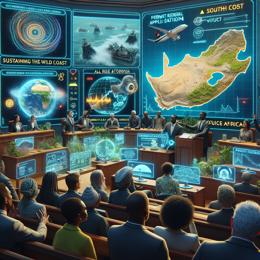Content created by AI
Maine Lobstermen Challenge Whale-Protection Tracking Requirements
A stark controversy pits the traditional ways of Maine's lobster fishermen against modern conservation efforts designed to save the critically endangered North Atlantic right whales. The frontline of this battle has moved to the federal courts, where a group of lobstermen has filed a lawsuit claiming that the new requirements to install 24-hour electronic tracking devices are unconstitutional.
This legal challenge arises out of measures that came into effect on December 15, pursuant to an initiative by the Maine Department of Marine Resources. The intent was straightforward: Collect more precise data to enhance the fishery management and mitigate the risk of right whales becoming entangled in fishing gear—a situation that could be fatal for these majestic creatures.
The plaintiffs, part of a lobster fishing union, sharply criticize the rigidity of the monitoring system, which does not discriminate between fishing and non-fishing activities. They consider the around-the-clock surveillance excessive and a violation of their rights, expressing through their lawyers, Thimi Mina and Alfred Frawley IV, that Maine lobstermen are committed to the ecosystems they rely on due to generations of sustainable practices.
This escalation of discontent reflects a broader, long-standing tension over fishing monitoring. While many commercial fishing groups decry such measures as governmental overreach, regulatory bodies like the Atlantic States Marine Fisheries Commission regard them as indispensable for managing fishery resources with accurate, updated data.
With fewer than 360 North Atlantic right whales believed to exist, conservation efforts have acquired a sense of urgency, a point reflected in the regulations announced by the Atlantic States Marine Fisheries Commission in 2022. The goal is clear-cut: informed management decisions to change the declining trajectory of these whales. The commission, however, has not yet fully reviewed the fishermen's complaint according to their spokesperson.
Patrick Keliher, the commissioner of the Maine Department of Marine Resources, remains firm on the position that the trackers ultimately benefit lobster fishermen by preventing management decisions based on insufficient data. An argument suggesting that short-term sacrifices could lead to long-term sustainability gains for both lobsters and the right whales entangled in the lobstermen's fates.
The tracking devices, funded through congressional means, are now subject to debate as not all fishermen have installed them. The Maine Lobstering Union’s political director, Virginia Olsen, notes that despite the unresolved compliance, a hearing date for the case, to be held in the U.S. District Court for the District of Maine, is still pending.
In what seems to be a grave conundrum of environmental ethics, economic survival, and legal interpretations, Maine's lobstermen stand at a crossroads between the age-old tradition of lobster fishing and the need for deploying new technology in the interest of marine conservation efforts.










